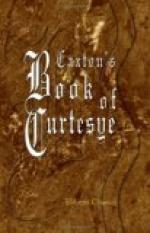[68]
Braced so straytly th[at h]e[1] may not plie,
[Sidenote 1: MS. the.]
But gaderith hit in by man_er_ of wyndlese,
And 3*if he wrenche aside or lytil wrye,
472
His gere stonte all in pertous[2] case,
[Sidenote 2: Read perlous?]
The scho, the hose, the point, doublet,
and lace;
And if ought breke, som_m_e
thing_es_[3] that ben badde
[Sidenote 3: Read toung_es_.]
Shall sey anon, ‘a knaue
hath broke a ladde.’ 476
[Sidenote: _ Hill’s Text._]
P) Wynter & somer to his soverayn_e_
Capron hardy, no bonet lyst
to avayle, 457
For eu_er_y worde geveyng his mayst_er_
twayn_e_,
avavntp_ar_ler In eu_er_y
manys tale,
Absolon w_i_t_h_ disheveld
heres smale, 460
lyke to a prysoner
of saynt malowes,
A sonny busshe
able to the galowes.
P) O! I passe nortvre! fy, fy, for sham!
I myght haue said he shuld
go havke & honte, 464
ffor that shuld be a gentylman[i]s
game,
To suche dysport_is_ gentill[e]
folk_is_ be wonte;
I sayd to ferre, my langage
was but blonte;
but yet, sir gallavnt,
wha_n_ ye shall[e] bowe or knele 468
he got[=h] by
co_m_passe rovnd as doth a whele.
P) Brased so streyte [th]at he may not plye,
but gaderyth yt by maner_e_
of a wyndlas;
& he awght wrench a-side, or a litill[e]
wrye, 472
hys gere stondyt[=h] the_m_
i_n_ full[e] p_ar_lovs caas,
hys sho / his hose / doblet,
poynt & laas;
& yff owght breke,
su_m_ tonges that be bade
will[e] moke &
say, “A knave hath broke a lade.”
476
CAXTON’S TEXT.
[66]
Wynter and somer to his souereyne
Capron hardy / no bonet lyste to auale
[Sidenote: not doffing his cap to his master,]
For euery word / gyui_n_g his maister tweyne
458
Auauntparler / in euery mannys tale
[Sidenote: forward in speech,]
Absolon with disheueld heeris smale
[Sidenote: rough-haired,]
Lyke to a prysoner of seynt malowis
[Sidenote: and lousy-headed,]
A sonny busshe / able to go to the galowis
462
[67]
O I passe norture fy fy for shame
[Sidenote: (though it’s hardly good manners
to say so.)]
I myght haue said he shold go hauke & honte
For that shold be a gentilmans game
465
To such disportes / gentil folkes be wonte
I sayd to ferre / my langage was to blonte
But yet sir gala_n_te wha_n_ ye shal bowe or knele
[Sidenote: When he tries to kneel, he works round
like a wheel,]
He goth by compace round as doth a whele
469
[68]
[Sidenote: Leaf 12 a.]




